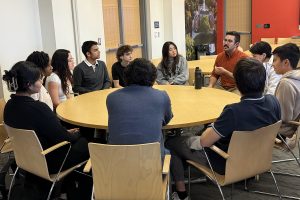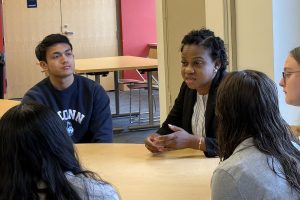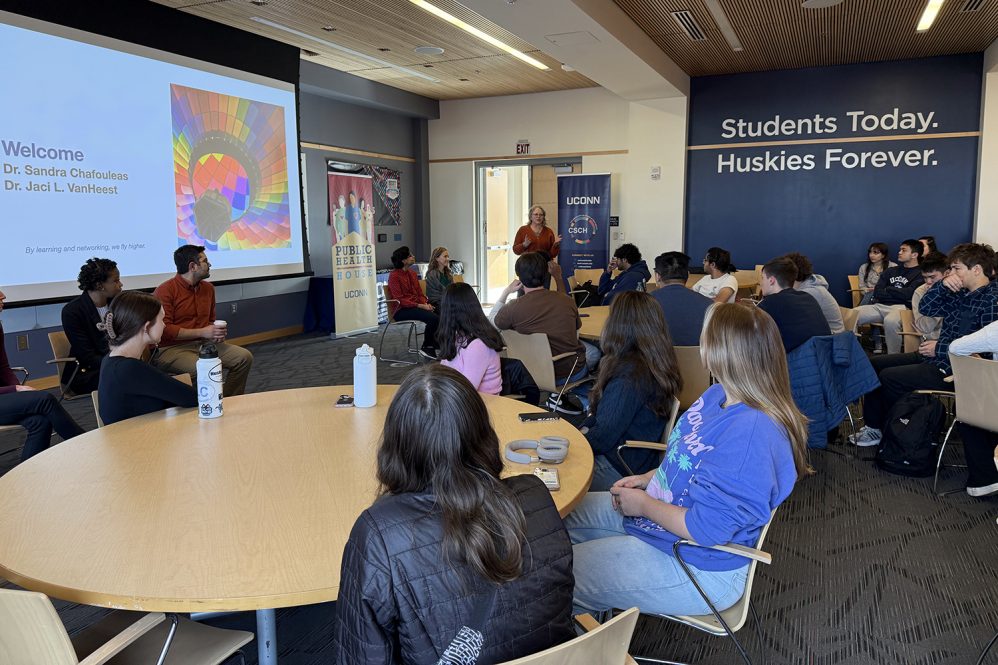UConn researchers met with undergraduate students in the UConn Public Health House Learning Community on April 8 in a celebration of public health week and as part of a long-running collaboration between the community and the UConn Collaboratory on School and Child Health (CSCH).
Over 75 first- and second-year students gathered in Werth Tower to hear from the researchers, all of whom are CSCH affiliates who work on issues relating to school and child health.
The researchers included:
- Sandra Chafouleas, Board of Trustees Distinguished Professor and Neag Endowed Professor, Department of Educational Psychology and co-director of CSCH
- Kevin Ferreira van Leer, assistant professor, Human Development and Family Sciences
- Jessica Koslouski, assistant research professor, Educational Psychology
- Maria LaRusso, assistant professor, Human Development and Family Sciences
- Christina Ross, assistant professor, School of Nursing
- Sudha Srinivasan, assistant professor, Kinesiology
Jaci VanHeest, associate professor in Educational Psychology, faculty director of the Public Health Learning Community, and CSCH steering committee member, moderated the event.

After giving brief introductions about their background, the six researchers — from four UConn schools and colleges — each led a small group discussion about their career path and their current projects. Students rotated to a different researcher halfway through the event.
Areas of research represented at the event included children’s social-emotional learning and well-being; child and parent well-being in immigrant families; trauma-informed approaches in schools; the use of puppets to teach kids coping strategies; the development of fun assistive technologies that can help children with developmental disabilities; and the development of an app to help Black adolescent females learn about sexual health.
“The range of faculty showcased the variety of fields that work to promote child health as well as many overlapping areas of focus and inquiry,” Koslouski said.
“Learning about their fields of study and current projects gave me a new perspective on how broad the field is,” said Hannah Tuxbury, a second-year physiology and neurobiology major. “I was able to see how passionate these professionals were about the work that they do, which made me excited to explore the opportunities that are out there.”
The small group discussions gave students a chance to also ask questions of the researchers in an informal setting. Students asked specific questions about particular research projects, fields as a whole, what classes the researchers recommended, and the impact of the research.
“I enjoyed getting to know the students, learning about their experience in the learning community, and discussing research with them,” Ross said.
“I was really struck by the critical questions students asked about how research can influence policy that support children’s well-being,” Ferreira van Leer said. “Multiple students asked nitty gritty questions about how the research process can center policy-relevant questions and use findings to inform policy.”
Both researchers and students also appreciated the more casual format.
“Learning about [the researchers’] fields of study and current projects gave me a new perspective on how broad the field is. … which made me excited to explore the opportunities that are out there.” — Hannah Tuxbury, student
“It is a wonderful initiative for students to have the opportunity to connect with researchers on campus in a safe, non-intimidating environment,” Srinivasan said.
“I thought that it was a great way to get people talking to professors about research in a conversational way,” agreed Avery Hawthorne, a second-year physiology and neurobiology major.
And students weren’t the only ones learning at the event.
“I learned a lot about what other faculty across campus are working on and getting to know them was a pleasure,” Ross said. “I hope other faculty get to engage in this activity in the future.”
Over the past seven years, UConn Public Health House and CSCH have collaborated on many events, including panel discussions, participating in the recording of CSCH Live Talks, research panels, UConn Gives, and the building of puppets through the Feel Your Best Self project.

“Our collaboration with the Public Health House Learning Community has been the highlight of my spring semester for many years,” Chafouleas said. “Although our activities have varied by year, each opportunity has presented terrific opportunities to amplify collective interests in child, family, and school health.”
“The partnership between PHLC and CSCH has been a cornerstone of our scholarly activities over the past seven years,” VanHeest said. “Our students have been challenged to explore themselves and the broad scope of health issues through these interactions. We are excited about furthering this partnership.”
Part of the Collaboratory’s mission is to educate and mentor students in the science of school and child health. This is the third meet-the-researcher event put together by the two teams; the style and content of the event has been a consistent hit with involved students and faculty.
It was an amazing experience,” said first-year student Amelia Espinal, a speech, language and hearing sciences major. “I learned so much about things that will truly help me with my future career. The presenters were incredibly friendly and eager to help, always ready to answer any questions my friends and I had.”
“The opportunity to interact with young, curious, and enthusiastic minds was invigorating,” Srinivasan said. “It was wonderful to be able to share my journey with the students, hear their questions, and offer my perspective.”
“I really enjoyed the roundtable conversations,” Ferreira van Leer said. “I left the conversation hopeful about the role students can play in research and excited to see the large interest in getting involved in the research process.”



